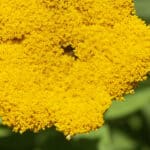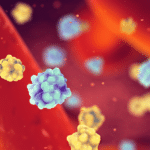It was a sight to behold, as Dr. Franjo Grotenhermen, director of the International Association for Cannabinoid Medicines (IACM), rolled in on a gurney, his large frame laying sideways with a microphone placed near his mouth. Unable to sit up or stand because of a rare, chronic disease, this German force of nature had arrived to give out the awards at the 12th IACM conference in Basel, Switzerland, in October 2022.
Several hundred people were in attendance when Grotenhermen presented the first award for the best clinical poster, an observational study on the use of a standardized cannabis oil extract with a THC:CBD ratio of 1:2 for severely demented patients. Of the 19 patients who participated in this 13-month study, none saw serious adverse events or discontinued use because of side effects. But there were noteworthy clinical improvements for rigidity, agitation, behavioral problems, decreased prescription drug use, and easier caregiving. Family members interviewed for the study expressed appreciation for the increased connection with a loved one who had been slipping away.
(A complete list of the 43 posters that presented new findings at this year’s IACM can be seen here.)
The Doctor

A major figure behind medical cannabis in Europe, Dr. Grotenhermen founded the IACM with his American colleague Dr. Ethan Russo 22 years ago. A recent documentary film, ‘The Doctor’, describes how a friend from his political days at the university introduced Grotenhermen to the cannabis issue because he needed a report for the government on whether or not hemp can get you high. This research initially drew Grotenhermen into the history of cannabis as a medicine, and then he started learning more from his patients.
“He’s one who says and really, really thinks that the patient comes first,” says Carola Pérez, the Spanish leader of the IACM Patient Council.
In 2017, Grotenhermen went on a hunger strike to protest restrictions in Germany’s first medical cannabis laws. Lately, he’s been pressuring the Bundestag, Germany’s Parliament, to force insurance companies to follow the law and only refuse to cover medical cannabis in extraordinary situations. “A civilized society should not deny access to a medicine to a patient when a doctor says he needs it,” he asserts.
Accolades for a Swiss Scientist
Next up in Basel, Dr. Grotenhermen announces a thank-you award to his friend Dr. Rudolf Brenneisen, the long-term fighter for cannabinoid medicine in the mountainous redoubt of Switzerland. As the founder and chief of the Swiss Task Force for Cannabinoids in Medicine for over ten years, Dr. Brenneisen has advanced the cause of cannabis medicine with his prodigious research and advocacy. More recently, he has criticized the bureaucratic requirements that force a Swiss doctor to apply (and wait for weeks) for a special cannabis permit from the Federal Office of Public Health. Brenneisen prefers the German system that allows patients to buy cannabis from a pharmacy with a prescription.
Dr. Grotenhermen also thanked his friend for working tirelessly behind the scenes to make this conference happen. “I’m addicted to studying the plant,” says Brenneisen. “Not smoking it. I only smoked a joint once and I couldn’t inhale, and it wasn’t a good experience.” (It’s a common refrain among some researchers at IACM – they love the plant intellectually, but not to use it themselves). Dr. Brenneisen takes a special interest in the interplay of the two-thousand-plus constituents of the plant: “Was die beitragen, wissen die Götter.” What they contribute, [only] the gods know.
It’s here that the emotions start to crest. The old German fighter praising the old Swiss fighter for years in the trenches, butting against head-burying politicians, chiseling insurance companies, and prohibitionist die-hards. They’ve watched medical cannabis go from a punchline about glaucoma to its return as one of the most important plants for human health. Their work has helped to inspire many of the presentations at this year’s IACM meeting, which featured 26 lectures with reviews of clinical studies for different conditions: PTSD and sleep, gastrointestinal disorders and their relation to mental health, autism and ADHD, Tourette syndrome, and CBD for the burnout of healthcare workers during COVID, and more.
There were also dramatic case studies that attest to the dermatological uses of cannabis from Grotenhermen himself. And Dr. Eva Bergsträsser compellingly discussed how cannabis can help with extreme pain and other problems of severe pediatric conditions like cancer, malformations, and neuromuscular disorders. Cannabis medicine for very sick children should be a banner we can all get behind.
But it’s not. Several of the reviews of clinical data ended with researchers lamenting the limitations of what they presented. Many of the existing studies are observational in nature – doctors watching the medicine work. But the world demands gold-standard, double-blinded, placebo-controlled clinical trials – and these are very expensive. Few funding bodies have been willing to step forward to push cannabinoid science to the next level of clinical use, and pharmaceutical companies have zero incentive to study an unpatentable crude plant.
Patients Quandary
This leaves patients in an untenable position. They know cannabis works for them – or they’ve seen it work for their friends. But access to the medicine is expensive or illegal. In many cases, regulations require that they must run through all the other treatments in the usual ‘standard of care’ – pharmaceuticals that often cause unpleasant side effects – before they can use cannabis. The IACM Patient Council gives voice to these patients. (Sign up for their newsletter, follow them on social media, and amplify their message.) During the 40 minutes allotted to the Patient Council on stage, they shared some of the most powerful and memorable statements at the conference.
From her wheelchair, Franziska Quadri of Switzerland rails against the fact that patients can’t afford the medicine, they’re forbidden to grow it themselves, and on top of that there’s the governmental idiocy of a socialist state that increases its own healthcare costs. Before cannabis, she went to the doctor twice a month. Now she goes twice a year.
Jacqueline Poitras of Greece noted that the patients on stage had a combined total of more than 60 years of experience with using medical cannabis. Over 1700 families participate in her Facebook group for families with autism. Maximilian Plenert of Germany shares his thoughts about the complete lack of guidance from the government, and he urges the audience filled with MDs to write up their case reports. “If you listen to the patients, you can learn so much,” he pleads.
One doctor stood up to ask, how can we help? The moderator Carola Pérez responded, “First, sit and listen to us. We have so many ideas. We know how to talk to politicians. We can make a difference.” And in one of the most poignant statements from the stage, she adds, “We see how the room empties when the patients come on stage. You should stay and listen to us and our stories.”
Stories That Can Change the World
Tom Curran, a patient advocate from Ireland, tells about it being one of the worst places in the world for medical cannabis. He knows of one caregiver who went to prison in Ireland for three months because of his wife’s cannabis. So his wife lost both her caretaker and her medicine.
In describing his wife’s challenges, Tom can barely speak through the tears. His wife had multiple sclerosis. “She knew the MS would take her life – but she wanted to choose her death.” He knew “that without cannabis, she would have made that decision ten years earlier. So the medicine gave me ten more years with her.”
A last story. The father of one of the patients in the audience is a bricklayer from France. A quiet white-haired chap, the kind of fellow you trust right off the bat. While waiting for the long line of people who wished to speak with his disabled daughter, he quietly shared about how he started growing cannabis for her because it was the only thing that helped. She found some seeds through her network of patient friends, and her father decided to educate himself about cultivating cannabis. “It’s all on YouTube videos. I just watched a lot of them,” he said. “I never grew a plant before. But I work with my hands and I learn well. And it grows so well. You don’t have to do a lot.”
“We spend five months a year in Spain, so I’m okay there,” he explains. “The other seven months in France, I could go to prison [for growing cannabis]. But I’m a pensioner. I have the time. And it’s what works for her.”
He shares the cannabis he grows with his daughter’s friends who have MS and other conditions that benefit from it. He used to put it in alcohol, but that started to upset her stomach. So he learned how to make cannabutter. “Butter, the bud, a little water and boil it gently for thirty minutes.” He laughs softly with a smile, “and there you go. One day, and it’s all ready.”
Cannabinoid science can be jaw-dropping. But sometimes at a conference like this, we learn the most from the stories of the people who live them.
EDITOR’S NOTE: Project CBD is a designated US ambassador for the IACM.
Lex Pelger writes articles about psychoactives and the endocannabinoid system. He publishes a weekly cannabinoid science newsletter Cannabinoids & the People and conducts 1-on-1 education sessions on using CBD, PEA, THC & CBDA for serious health conditions. © Copyright, Project CBD. May not be reprinted without permission.
Recommended Readings
ICRS 2019: CBD for Anxiety, Cancer, Heart Disease, Addiction…
New discoveries highlight CBD’s potential for treating anxiety, cancer, heart disease, substance abuse, brain injuries, and more.
ICRS 2018: CBD Shines in Leiden (Part 1)
New scientific findings highlight the 28th annual meeting of the International Cannabinoid Research Society.
ICRS 2018: Report from Leiden (Part 2)
Targeting the endocannabinoid system for therapeutic relief.











